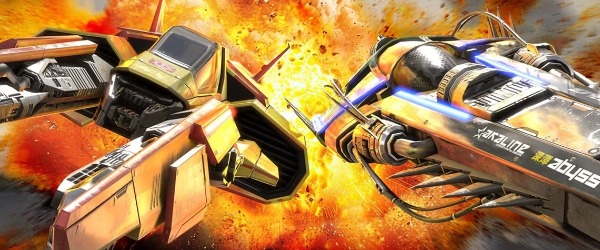
The Guided Fate Paradox (PS3) - Review
by Karl Koebke , posted on 07 November 2013 / 4,908 ViewsThe Guided Fate Paradox is a game about Renya, the unluckiest boy in the world who goes to the mall and finally wins the grand prize in one of those lottery games they have in Japan which I never see here in Wisconsin. Renya's luck seems to have turned around as he doesn't just win a mere trip to a tropical island but the actual title of God himself. Yep, that's right, apparently the title of God is decided by a lottery machine at the mall. Of course he quickly finds out that being God isn't all it's cracked up to be and actually comes bundled with a hell of a lot more busy work than you'd think.
While the story contains some funny moments, it's the more serious aspects of the narrative that I was most impressed by. NIS games are usually better known for their humor than overall story but The Guided Fate Paradox is a clear departure from this rule of thumb. Answering each believer's prayer makes for interesting little side stories, and they all came together as you discover the real purpose these angels have in making you God. Admittedly the emotional moments that were meant to elicit a response didn't really hit home because I basically knew that it'd all work out in the end, but it was a fun ride for more than just the laughs. In similar vein to other games by NIS, though, if you're looking for a game to wow you visually you should probably move along. Just as with Disgaea 4, the sprites are much improved from Disgaea 3, but the 3D environments are still pretty lackluster. Overall it's another case of serviceable presentation, but there's nothing to write home about.
Answering prayers doesn't require any convoluted moral choices like you might expect, so how exactly does God go about answering the prayers of his faithful? Well, he walks around in Rogue-like dungeons beating down on monsters, of course. It's actually right there in the footnotes of Leviticus if you squint a bit. At the start of each dungeon you'll be at level one, and you can then use the trash monsters on the way to the boss to boost your stats to higher levels. If you leave, you have to start all the way from floor one for that dungeon and you're obviously back to level one again. Dungeons only have 10 floors max, so it's not as bad as you might think, but it can be rough when you're banging your head against the final boss and all you want to do is see if you have to grind more or you actually stand a chance this time.
“Grinding?” you say, “But you go back to level one at the start of each dungeon.” While this is true, that doesn't mean that grinding is a thing of the past, it just becomes a bit more complicated. Every time you leave the dungeon, whether by choice, boss victory, or your own demise, you'll add the levels you gained onto your total level. As your total level goes up so do your base stats, which has an even greater effect at higher levels. So don't worry if you aren't winning against a given boss, you'll still get something out of the effort you've put in.
Just make sure to bring an exit item, because if you actually die you lose all of the equipment you have on you and everything else you're carrying, which is such a huge hit. It basically meant is lost half an hour's worth of grinding every time I died. Usually this wasn't too problematic, since I was always pushing too hard when I died so it was my own fault, but the last few times I tried the final boss stage it just felt like nothing would go right; getting killed three times in a row and losing two hours' worth of play time in total is a trial no matter how fun the gameplay might be.
Saving is possible in-between dungeons, and there's also a save state and then resume function you can use at the end of each level. Resuming will erase the save state, though, so this is only useful when schedules require you take a break in the middle of a dungeon. My trek through Godhood took me 35 hours, with about 3 hours of that not showing up in my save file because of reloading after deaths. You can replay after that and work your way through the martial training dungeon but there aren't any obvious story incentives for doing so.
Equipment can be strengthened or combined to increase its base stats, but what I found really interesting was that your equipment goes through similar cycles to your character. Defeating enemies with a given piece of equipment on your character will slowly fill up a burst meter and increase the benefits of that piece of gear by leaps and bounds. Fill the bar completely and the equipment will burst and its stats will go down below even the starting level. This allows you to strengthen and combine equipment, but it creates an interesting puzzle when it comes to bosses. Obviously trying to defeat a boss with all burst gear is a fool's venture, so instead you have to manage your equipment's burst level and get it suitably high before switching to a set you don't need so you can save all of that bursty goodness for the boss stage. This becomes hugely important for the final boss who has wave after wave of jobber monsters, but you'll also need your best gear to survive his attacks. I was constantly switching between sets and after about half an hour I finally achieved a sweet victory.
Strategic thinking also comes into play a bit with the dungeon layouts, as each dungeon features its own unique twist. Cube levels that require spatial recognition, levels with water levels you can set, and fruit that initially buffs but eventually damages you are a few of the stand-out scenarios. It's impressive that they managed to make all of these variations work with a random level maker. Every now and then I would start a level and get completely smashed by a room filled to the brim with monsters, but that's just the way the game is played.
Unfortunately, the brilliance of my AI companion did not match up to the brilliance of these dungeon gimmicks and she would often get herself killed in the most idiotic ways possible. She never even considered taking advantage of the patterns of the enemies or her defensive skills. It's like having a baby companion wielding a sword. Sure, it'll kill stuff for you, but is it really worth the responsibility? Thankfully she isn't used in the boss fights and you don't lose her equipment when she perishes, so you can just let her die if you get too fed up with the AI's antics.
People always say “playing God” like it's inherently negative, but I actually had a good time with The Guided Fate Paradox. Granted, it turns out angels are idiots, and even God can't avoid reloading after death, but the interesting dungeon layouts, unexpectedly serious storyline, and strategic thinking behind the equipment system all combine to create a novel experience. I hope the next time I go to the mall I get my own chance at this job of a lifetime, or at the very least maybe a part-time job as a Netherworld Overlord.
VGChartz Verdict
7.6
Good
This review is based on a retail copy of The Guided Fate Paradox for the PS3, provided by the publisher.


























 Essay Pro
Essay Pro